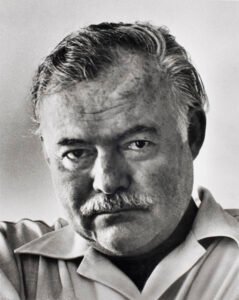Books By Ernest Hemingway
- The Sun Also Rises (1926) – standalone
- A Farewell to Arms (1929) – standalone
- Death in the Afternoon (1932) – non-fiction
- Winner Take Nothing (1933) – short story collection
- Green Hills of Africa (1935) – non-fiction
- To Have and Have Not (1937) – standalone
- The Fifth Column and the First Forty-Nine Stories (1938) – short story collection
- For Whom the Bell Tolls (1940) – standalone
- Across the River and into the Trees (1950) – standalone
- The Old Man and the Sea (1952) – standalone
- A Moveable Feast (1964) – memoir
- Islands in the Stream (1970) – standalone
- The Garden of Eden (1986) – standalone
- True at First Light (1999) – standalone
About Ernest Hemingway
 Ernest Hemingway, born on July 21, 1899, in Oak Park, Illinois, United States, was a towering figure in 20th-century American literature, renowned for his spare and economical writing style, as well as his larger-than-life persona. Hemingway’s works are celebrated for their exploration of themes such as courage, stoicism, masculinity, and the human condition.
Ernest Hemingway, born on July 21, 1899, in Oak Park, Illinois, United States, was a towering figure in 20th-century American literature, renowned for his spare and economical writing style, as well as his larger-than-life persona. Hemingway’s works are celebrated for their exploration of themes such as courage, stoicism, masculinity, and the human condition.
Hemingway’s literary career began as a journalist, working for newspapers such as the Kansas City Star and the Toronto Star. His experiences as a war correspondent during World War I profoundly influenced his writing, shaping his distinctive prose style characterized by short, declarative sentences and understated emotion.
In the 1920s, Hemingway emerged as a leading figure of the “Lost Generation,” a term he popularized in his novel “The Sun Also Rises” (1926), which vividly captured the disillusionment and aimlessness of post-war expatriates in Europe. This novel marked the beginning of a prolific period for Hemingway, during which he produced several of his most acclaimed works, including “A Farewell to Arms” (1929) and “For Whom the Bell Tolls” (1940).
Hemingway’s writing is often characterized by its spare and unadorned prose, which reflects his belief in the iceberg theory of writing—whereby only the tip of the iceberg (the visible words on the page) is shown, while the bulk of the meaning lies beneath the surface. This approach to storytelling, combined with his keen observations of human behavior and his deep empathy for his characters, earned him widespread acclaim and cemented his reputation as one of the greatest American writers of the 20th century.
Throughout his life, Hemingway led a colorful and adventurous existence, traveling extensively, participating in bullfighting and big-game hunting, and cultivating a larger-than-life persona that became as legendary as his literary achievements. Despite his outward bravado, Hemingway struggled with personal demons, including depression and alcoholism, which would ultimately contribute to his tragic demise.
Ernest Hemingway’s legacy as a writer endures, with his works continuing to captivate readers around the world with their timeless themes and evocative prose. His influence on American literature and culture remains profound, and his contributions to the literary canon continue to be celebrated and studied by scholars and readers alike.

